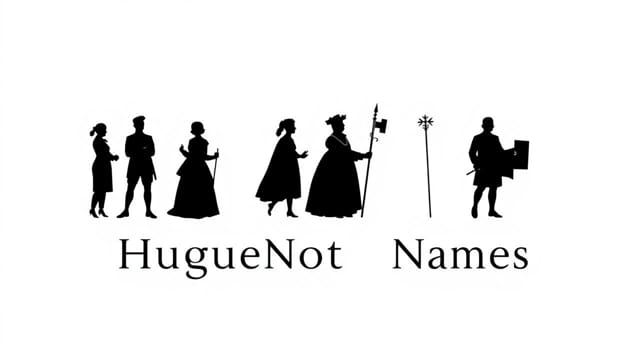During the 16th and 17th centuries, thousands of Huguenots French Protestants fled religious persecution in Catholic France and sought refuge across Europe. England became one of their key sanctuaries. As these refugees settled, they brought with them skills in craftsmanship, industry, trade, and artistry. Many Huguenots assimilated over time, and their surnames became part of English heritage. Tracing these names offers not just genealogical interest, but also a window into migration, adaptation, and the shaping of England’s socio-economic landscape. The legacy of Huguenot names in England continues to hold historical, cultural, and personal significance today.
Background of the Huguenot Migration to England
The Huguenots began arriving in England in waves, particularly after the St. Bartholomew’s Day Massacre in 1572 and following the revocation of the Edict of Nantes in 1685. These French Protestants were primarily Calvinists and faced escalating violence and state-sanctioned oppression in Catholic France. England, which was itself a Protestant country under monarchs like Elizabeth I and later William III, offered relative safety and support.
Many Huguenots settled in London, Canterbury, Norwich, and other urban centers. Over time, their French surnames were either anglicized or kept in their original form, depending on integration and regional preferences. Understanding these names helps identify ancestral lines and reveals their contributions to English society.
Common Characteristics of Huguenot Surnames
Huguenot names often originated from the French language and reflected occupations, locations, or traits. Some names were modified to fit English phonetics, while others remained unchanged. Certain suffixes like ‘-ier,’ ‘-eau,’ or ‘-elle’ are strong indicators of French roots. Over generations, spelling changes or simplifications occurred naturally as families adapted to their new environment.
Reasons for Name Changes
- Ease of pronunciation in English
- Desire for social integration
- Anglicization during legal registration or baptism
- Clerical spelling variations over time
List of Notable Huguenot Names in England
Below is a representative list of Huguenot surnames that became part of English records. These names are often found in old parish registries, naturalization documents, and guild memberships. Many of these families contributed significantly to English culture, science, business, and religion.
Craftsmen and Artisans
- Cabrol often associated with silversmithing
- Delafosse known among watchmakers and engravers
- Fontaine meaning fountain, commonly found among craftsmen
- Lenoir literally the black, possibly referencing hair or attire
- Mercier from the French for ‘merchant’
Weavers and Textile Workers
- Beaumont popular among silk weavers in Spitalfields
- Guenet often linked to linen production
- Rochelle possibly derived from La Rochelle, a Huguenot stronghold
- Petit meaning small, found among textile families
- Vallois believed to originate from the Vallois region in France
Religious and Clerical Figures
- Boileau prominent Huguenot family, some became ministers
- Champney noted for involvement in early Protestant congregations
- Dumont meaning of the mountain, sometimes associated with clergy
- Massé common among church record keepers
- Vigneron originally vine grower, but later tied to clerical families
Scientific and Academic Contributors
- Bayle philosophers and writers, brought Enlightenment ideas
- Chardin associated with travel literature and cultural studies
- Launay families that supported early publishing or printing
- Pain contributed to early medical practices in London
- Perreau sometimes linked to educational reformers
Huguenot Influence on English Society
The influence of Huguenot families went beyond their names. They strengthened entire industries like silk weaving in Spitalfields, watchmaking in Soho, and military service. Their presence fostered economic growth and cultural diversity in urban centers. They brought new techniques and helped lay the groundwork for industrial development in England.
Industries Impacted by Huguenots
- Textile manufacturing (especially silk and lace)
- Gold and silversmith trades
- Banking and finance
- Printing and publishing
- Religious reform and education
Tracing Huguenot Ancestry Through Surnames
Many individuals today seek to trace their Huguenot ancestry through surnames found in historical records. English archives, Huguenot societies, and parish documents can offer valuable leads. Often, a single surname can open up extensive genealogical pathways leading back to France and beyond.
Tips for Researching Huguenot Names
- Consult baptism and marriage records in areas like Canterbury or Spitalfields
- Check naturalization records for French surnames between 16001750
- Use surname variants and spelling alternatives during searches
- Explore guild and trade registries
- Join Huguenot heritage or genealogical groups for collaborative research
Legacy of Huguenot Names in Modern England
Today, many English families still carry names of Huguenot origin, sometimes unknowingly. These surnames serve as a reminder of a turbulent period in European history and the strength of those who survived it. The assimilation of Huguenot names into English life is a testament to cultural endurance, resilience, and contribution. Their descendants have gone on to achieve prominence in various fields, maintaining a legacy born out of adversity and perseverance.
Understanding the list of Huguenot names in England is not just an exercise in genealogy it is a way to connect with a significant chapter in history. It reveals the interwoven stories of faith, flight, and survival that helped shape modern Britain. As researchers and families continue to uncover these names, the stories they tell grow ever more meaningful.
